BUS 300: Analyzing Corruption and Mitigation Strategies in Nepal
VerifiedAdded on 2023/05/28
|7
|2186
|355
Report
AI Summary
This report examines the multifaceted issue of corruption in Nepal, detailing its various forms, including bribery, Chakari (favor-seeking), and Afno Manche (nepotism). It explores how these practices manifest at national, institutional, and societal levels, hindering Nepal's development. The report discusses the role of entrepreneurs, officials, and government bureaucrats in perpetuating corruption and highlights the challenges in implementing effective anti-corruption measures. It also mentions the support from international organizations like DFID in setting higher standards and fraud risk management. The report emphasizes the need for broader understanding and alternative data collection methods to address corruption effectively. Desklib provides access to this report and a wealth of study tools for students.
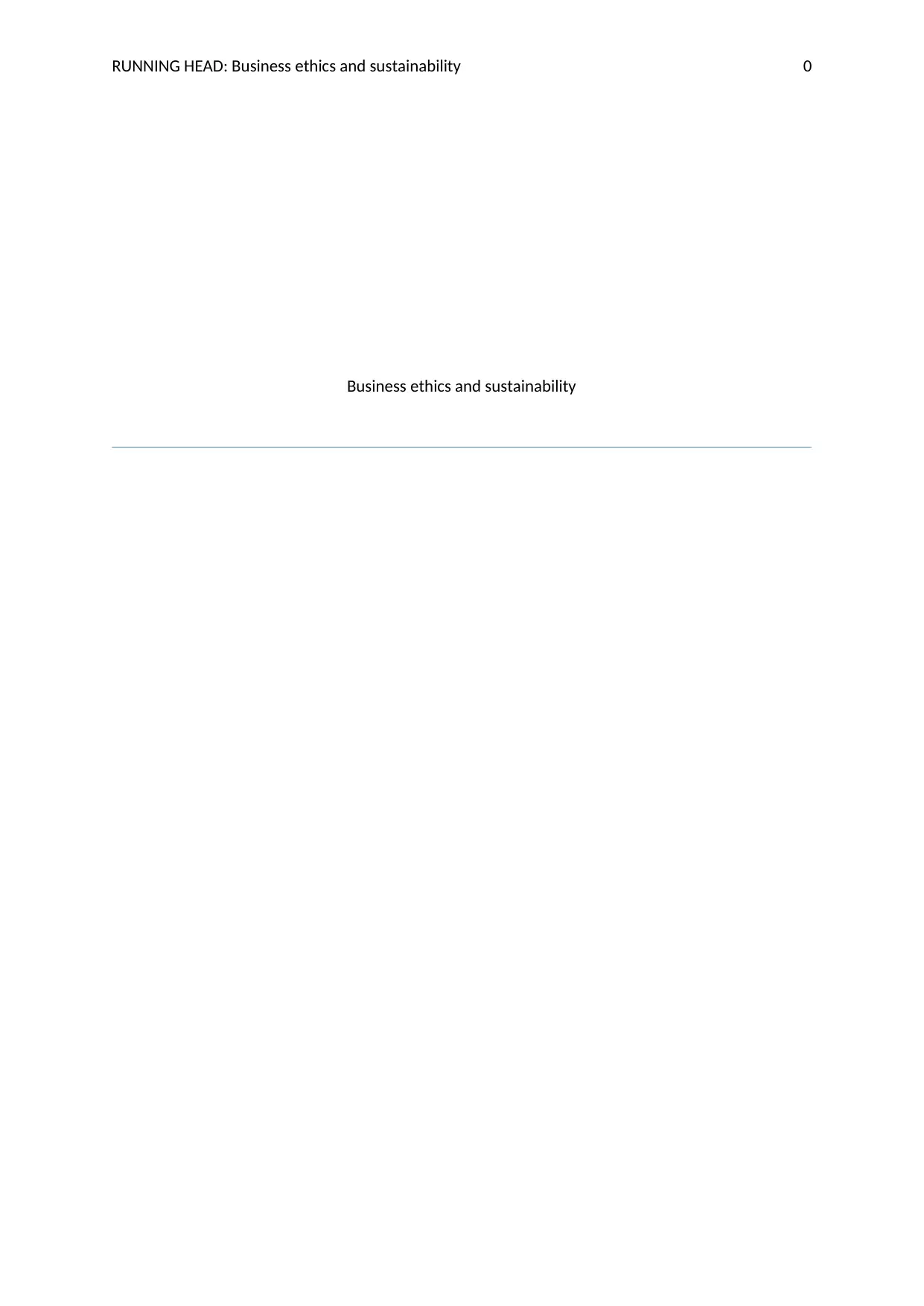
RUNNING HEAD: Business ethics and sustainability 0
Business ethics and sustainability
Business ethics and sustainability
Paraphrase This Document
Need a fresh take? Get an instant paraphrase of this document with our AI Paraphraser
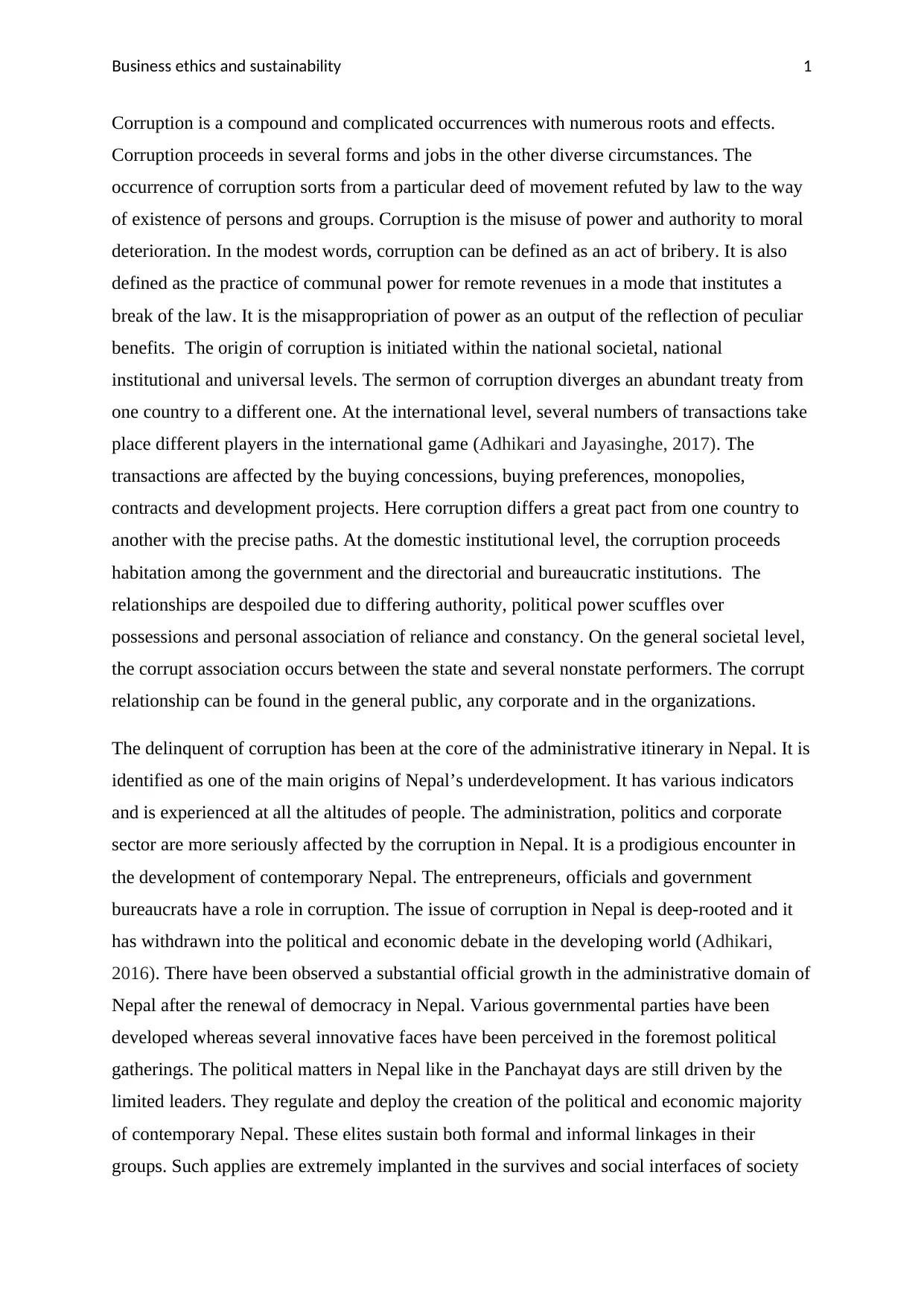
Business ethics and sustainability 1
Corruption is a compound and complicated occurrences with numerous roots and effects.
Corruption proceeds in several forms and jobs in the other diverse circumstances. The
occurrence of corruption sorts from a particular deed of movement refuted by law to the way
of existence of persons and groups. Corruption is the misuse of power and authority to moral
deterioration. In the modest words, corruption can be defined as an act of bribery. It is also
defined as the practice of communal power for remote revenues in a mode that institutes a
break of the law. It is the misappropriation of power as an output of the reflection of peculiar
benefits. The origin of corruption is initiated within the national societal, national
institutional and universal levels. The sermon of corruption diverges an abundant treaty from
one country to a different one. At the international level, several numbers of transactions take
place different players in the international game (Adhikari and Jayasinghe, 2017). The
transactions are affected by the buying concessions, buying preferences, monopolies,
contracts and development projects. Here corruption differs a great pact from one country to
another with the precise paths. At the domestic institutional level, the corruption proceeds
habitation among the government and the directorial and bureaucratic institutions. The
relationships are despoiled due to differing authority, political power scuffles over
possessions and personal association of reliance and constancy. On the general societal level,
the corrupt association occurs between the state and several nonstate performers. The corrupt
relationship can be found in the general public, any corporate and in the organizations.
The delinquent of corruption has been at the core of the administrative itinerary in Nepal. It is
identified as one of the main origins of Nepal’s underdevelopment. It has various indicators
and is experienced at all the altitudes of people. The administration, politics and corporate
sector are more seriously affected by the corruption in Nepal. It is a prodigious encounter in
the development of contemporary Nepal. The entrepreneurs, officials and government
bureaucrats have a role in corruption. The issue of corruption in Nepal is deep-rooted and it
has withdrawn into the political and economic debate in the developing world (Adhikari,
2016). There have been observed a substantial official growth in the administrative domain of
Nepal after the renewal of democracy in Nepal. Various governmental parties have been
developed whereas several innovative faces have been perceived in the foremost political
gatherings. The political matters in Nepal like in the Panchayat days are still driven by the
limited leaders. They regulate and deploy the creation of the political and economic majority
of contemporary Nepal. These elites sustain both formal and informal linkages in their
groups. Such applies are extremely implanted in the survives and social interfaces of society
Corruption is a compound and complicated occurrences with numerous roots and effects.
Corruption proceeds in several forms and jobs in the other diverse circumstances. The
occurrence of corruption sorts from a particular deed of movement refuted by law to the way
of existence of persons and groups. Corruption is the misuse of power and authority to moral
deterioration. In the modest words, corruption can be defined as an act of bribery. It is also
defined as the practice of communal power for remote revenues in a mode that institutes a
break of the law. It is the misappropriation of power as an output of the reflection of peculiar
benefits. The origin of corruption is initiated within the national societal, national
institutional and universal levels. The sermon of corruption diverges an abundant treaty from
one country to a different one. At the international level, several numbers of transactions take
place different players in the international game (Adhikari and Jayasinghe, 2017). The
transactions are affected by the buying concessions, buying preferences, monopolies,
contracts and development projects. Here corruption differs a great pact from one country to
another with the precise paths. At the domestic institutional level, the corruption proceeds
habitation among the government and the directorial and bureaucratic institutions. The
relationships are despoiled due to differing authority, political power scuffles over
possessions and personal association of reliance and constancy. On the general societal level,
the corrupt association occurs between the state and several nonstate performers. The corrupt
relationship can be found in the general public, any corporate and in the organizations.
The delinquent of corruption has been at the core of the administrative itinerary in Nepal. It is
identified as one of the main origins of Nepal’s underdevelopment. It has various indicators
and is experienced at all the altitudes of people. The administration, politics and corporate
sector are more seriously affected by the corruption in Nepal. It is a prodigious encounter in
the development of contemporary Nepal. The entrepreneurs, officials and government
bureaucrats have a role in corruption. The issue of corruption in Nepal is deep-rooted and it
has withdrawn into the political and economic debate in the developing world (Adhikari,
2016). There have been observed a substantial official growth in the administrative domain of
Nepal after the renewal of democracy in Nepal. Various governmental parties have been
developed whereas several innovative faces have been perceived in the foremost political
gatherings. The political matters in Nepal like in the Panchayat days are still driven by the
limited leaders. They regulate and deploy the creation of the political and economic majority
of contemporary Nepal. These elites sustain both formal and informal linkages in their
groups. Such applies are extremely implanted in the survives and social interfaces of society
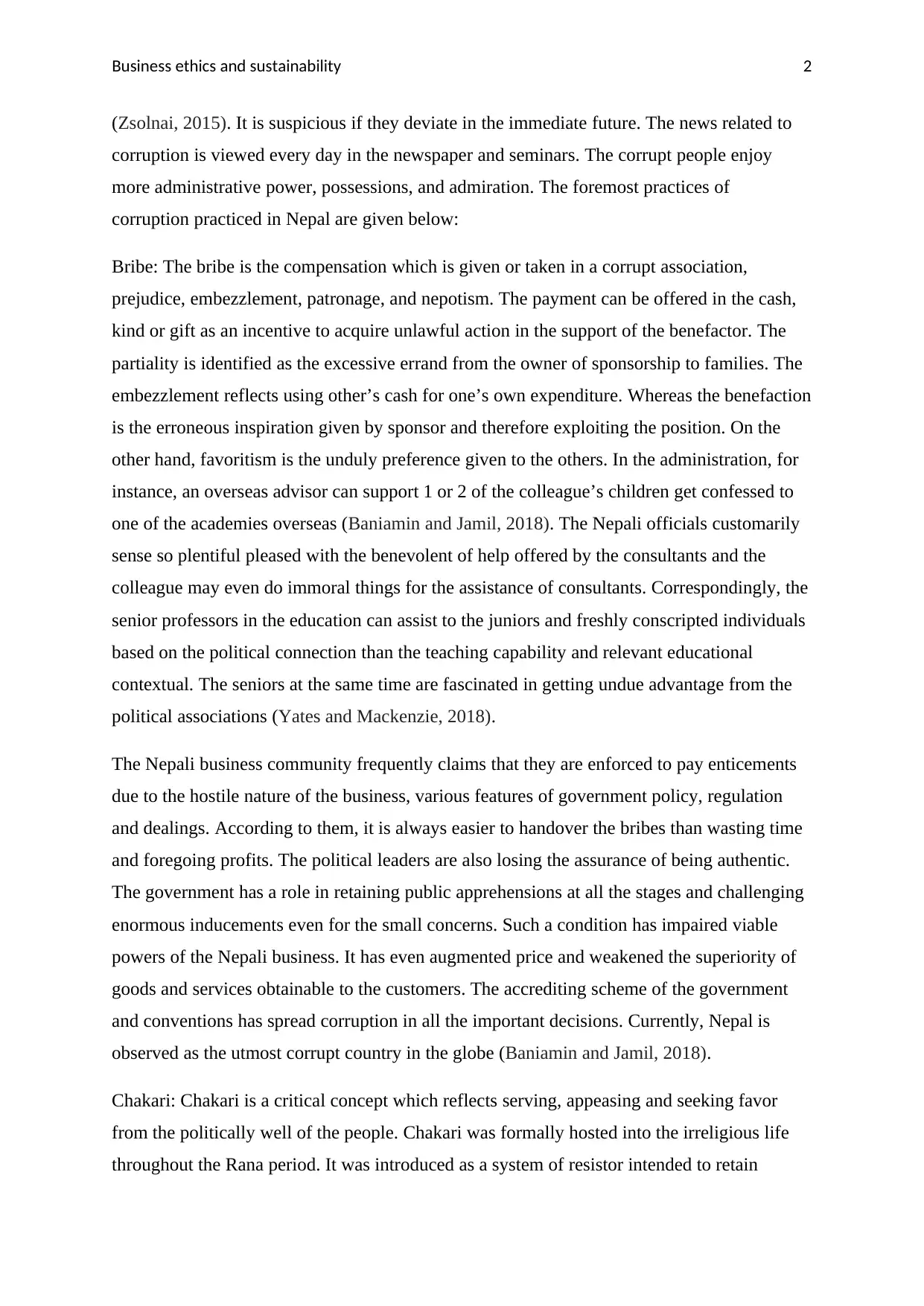
Business ethics and sustainability 2
(Zsolnai, 2015). It is suspicious if they deviate in the immediate future. The news related to
corruption is viewed every day in the newspaper and seminars. The corrupt people enjoy
more administrative power, possessions, and admiration. The foremost practices of
corruption practiced in Nepal are given below:
Bribe: The bribe is the compensation which is given or taken in a corrupt association,
prejudice, embezzlement, patronage, and nepotism. The payment can be offered in the cash,
kind or gift as an incentive to acquire unlawful action in the support of the benefactor. The
partiality is identified as the excessive errand from the owner of sponsorship to families. The
embezzlement reflects using other’s cash for one’s own expenditure. Whereas the benefaction
is the erroneous inspiration given by sponsor and therefore exploiting the position. On the
other hand, favoritism is the unduly preference given to the others. In the administration, for
instance, an overseas advisor can support 1 or 2 of the colleague’s children get confessed to
one of the academies overseas (Baniamin and Jamil, 2018). The Nepali officials customarily
sense so plentiful pleased with the benevolent of help offered by the consultants and the
colleague may even do immoral things for the assistance of consultants. Correspondingly, the
senior professors in the education can assist to the juniors and freshly conscripted individuals
based on the political connection than the teaching capability and relevant educational
contextual. The seniors at the same time are fascinated in getting undue advantage from the
political associations (Yates and Mackenzie, 2018).
The Nepali business community frequently claims that they are enforced to pay enticements
due to the hostile nature of the business, various features of government policy, regulation
and dealings. According to them, it is always easier to handover the bribes than wasting time
and foregoing profits. The political leaders are also losing the assurance of being authentic.
The government has a role in retaining public apprehensions at all the stages and challenging
enormous inducements even for the small concerns. Such a condition has impaired viable
powers of the Nepali business. It has even augmented price and weakened the superiority of
goods and services obtainable to the customers. The accrediting scheme of the government
and conventions has spread corruption in all the important decisions. Currently, Nepal is
observed as the utmost corrupt country in the globe (Baniamin and Jamil, 2018).
Chakari: Chakari is a critical concept which reflects serving, appeasing and seeking favor
from the politically well of the people. Chakari was formally hosted into the irreligious life
throughout the Rana period. It was introduced as a system of resistor intended to retain
(Zsolnai, 2015). It is suspicious if they deviate in the immediate future. The news related to
corruption is viewed every day in the newspaper and seminars. The corrupt people enjoy
more administrative power, possessions, and admiration. The foremost practices of
corruption practiced in Nepal are given below:
Bribe: The bribe is the compensation which is given or taken in a corrupt association,
prejudice, embezzlement, patronage, and nepotism. The payment can be offered in the cash,
kind or gift as an incentive to acquire unlawful action in the support of the benefactor. The
partiality is identified as the excessive errand from the owner of sponsorship to families. The
embezzlement reflects using other’s cash for one’s own expenditure. Whereas the benefaction
is the erroneous inspiration given by sponsor and therefore exploiting the position. On the
other hand, favoritism is the unduly preference given to the others. In the administration, for
instance, an overseas advisor can support 1 or 2 of the colleague’s children get confessed to
one of the academies overseas (Baniamin and Jamil, 2018). The Nepali officials customarily
sense so plentiful pleased with the benevolent of help offered by the consultants and the
colleague may even do immoral things for the assistance of consultants. Correspondingly, the
senior professors in the education can assist to the juniors and freshly conscripted individuals
based on the political connection than the teaching capability and relevant educational
contextual. The seniors at the same time are fascinated in getting undue advantage from the
political associations (Yates and Mackenzie, 2018).
The Nepali business community frequently claims that they are enforced to pay enticements
due to the hostile nature of the business, various features of government policy, regulation
and dealings. According to them, it is always easier to handover the bribes than wasting time
and foregoing profits. The political leaders are also losing the assurance of being authentic.
The government has a role in retaining public apprehensions at all the stages and challenging
enormous inducements even for the small concerns. Such a condition has impaired viable
powers of the Nepali business. It has even augmented price and weakened the superiority of
goods and services obtainable to the customers. The accrediting scheme of the government
and conventions has spread corruption in all the important decisions. Currently, Nepal is
observed as the utmost corrupt country in the globe (Baniamin and Jamil, 2018).
Chakari: Chakari is a critical concept which reflects serving, appeasing and seeking favor
from the politically well of the people. Chakari was formally hosted into the irreligious life
throughout the Rana period. It was introduced as a system of resistor intended to retain
⊘ This is a preview!⊘
Do you want full access?
Subscribe today to unlock all pages.

Trusted by 1+ million students worldwide
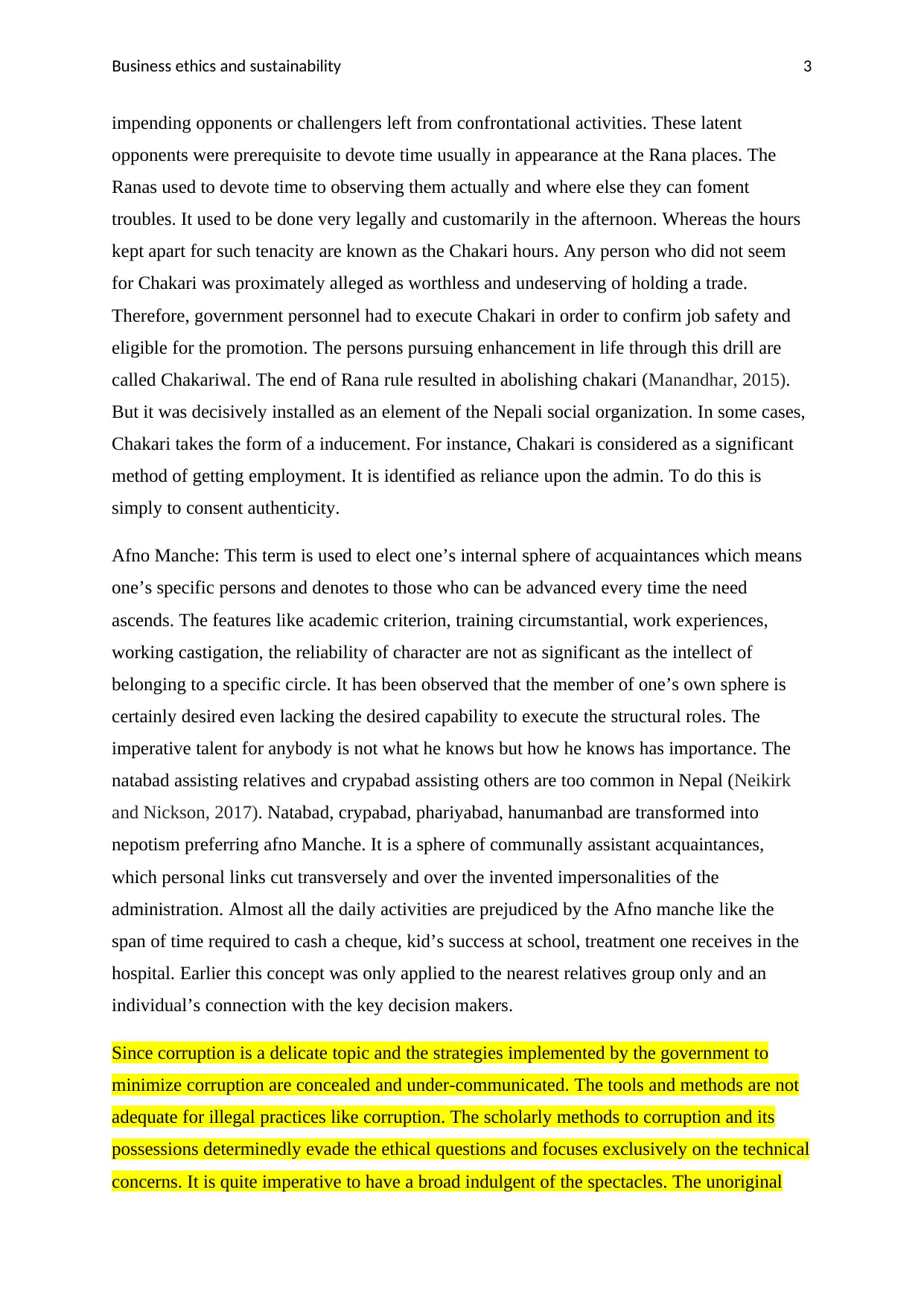
Business ethics and sustainability 3
impending opponents or challengers left from confrontational activities. These latent
opponents were prerequisite to devote time usually in appearance at the Rana places. The
Ranas used to devote time to observing them actually and where else they can foment
troubles. It used to be done very legally and customarily in the afternoon. Whereas the hours
kept apart for such tenacity are known as the Chakari hours. Any person who did not seem
for Chakari was proximately alleged as worthless and undeserving of holding a trade.
Therefore, government personnel had to execute Chakari in order to confirm job safety and
eligible for the promotion. The persons pursuing enhancement in life through this drill are
called Chakariwal. The end of Rana rule resulted in abolishing chakari (Manandhar, 2015).
But it was decisively installed as an element of the Nepali social organization. In some cases,
Chakari takes the form of a inducement. For instance, Chakari is considered as a significant
method of getting employment. It is identified as reliance upon the admin. To do this is
simply to consent authenticity.
Afno Manche: This term is used to elect one’s internal sphere of acquaintances which means
one’s specific persons and denotes to those who can be advanced every time the need
ascends. The features like academic criterion, training circumstantial, work experiences,
working castigation, the reliability of character are not as significant as the intellect of
belonging to a specific circle. It has been observed that the member of one’s own sphere is
certainly desired even lacking the desired capability to execute the structural roles. The
imperative talent for anybody is not what he knows but how he knows has importance. The
natabad assisting relatives and crypabad assisting others are too common in Nepal (Neikirk
and Nickson, 2017). Natabad, crypabad, phariyabad, hanumanbad are transformed into
nepotism preferring afno Manche. It is a sphere of communally assistant acquaintances,
which personal links cut transversely and over the invented impersonalities of the
administration. Almost all the daily activities are prejudiced by the Afno manche like the
span of time required to cash a cheque, kid’s success at school, treatment one receives in the
hospital. Earlier this concept was only applied to the nearest relatives group only and an
individual’s connection with the key decision makers.
Since corruption is a delicate topic and the strategies implemented by the government to
minimize corruption are concealed and under-communicated. The tools and methods are not
adequate for illegal practices like corruption. The scholarly methods to corruption and its
possessions determinedly evade the ethical questions and focuses exclusively on the technical
concerns. It is quite imperative to have a broad indulgent of the spectacles. The unoriginal
impending opponents or challengers left from confrontational activities. These latent
opponents were prerequisite to devote time usually in appearance at the Rana places. The
Ranas used to devote time to observing them actually and where else they can foment
troubles. It used to be done very legally and customarily in the afternoon. Whereas the hours
kept apart for such tenacity are known as the Chakari hours. Any person who did not seem
for Chakari was proximately alleged as worthless and undeserving of holding a trade.
Therefore, government personnel had to execute Chakari in order to confirm job safety and
eligible for the promotion. The persons pursuing enhancement in life through this drill are
called Chakariwal. The end of Rana rule resulted in abolishing chakari (Manandhar, 2015).
But it was decisively installed as an element of the Nepali social organization. In some cases,
Chakari takes the form of a inducement. For instance, Chakari is considered as a significant
method of getting employment. It is identified as reliance upon the admin. To do this is
simply to consent authenticity.
Afno Manche: This term is used to elect one’s internal sphere of acquaintances which means
one’s specific persons and denotes to those who can be advanced every time the need
ascends. The features like academic criterion, training circumstantial, work experiences,
working castigation, the reliability of character are not as significant as the intellect of
belonging to a specific circle. It has been observed that the member of one’s own sphere is
certainly desired even lacking the desired capability to execute the structural roles. The
imperative talent for anybody is not what he knows but how he knows has importance. The
natabad assisting relatives and crypabad assisting others are too common in Nepal (Neikirk
and Nickson, 2017). Natabad, crypabad, phariyabad, hanumanbad are transformed into
nepotism preferring afno Manche. It is a sphere of communally assistant acquaintances,
which personal links cut transversely and over the invented impersonalities of the
administration. Almost all the daily activities are prejudiced by the Afno manche like the
span of time required to cash a cheque, kid’s success at school, treatment one receives in the
hospital. Earlier this concept was only applied to the nearest relatives group only and an
individual’s connection with the key decision makers.
Since corruption is a delicate topic and the strategies implemented by the government to
minimize corruption are concealed and under-communicated. The tools and methods are not
adequate for illegal practices like corruption. The scholarly methods to corruption and its
possessions determinedly evade the ethical questions and focuses exclusively on the technical
concerns. It is quite imperative to have a broad indulgent of the spectacles. The unoriginal
Paraphrase This Document
Need a fresh take? Get an instant paraphrase of this document with our AI Paraphraser
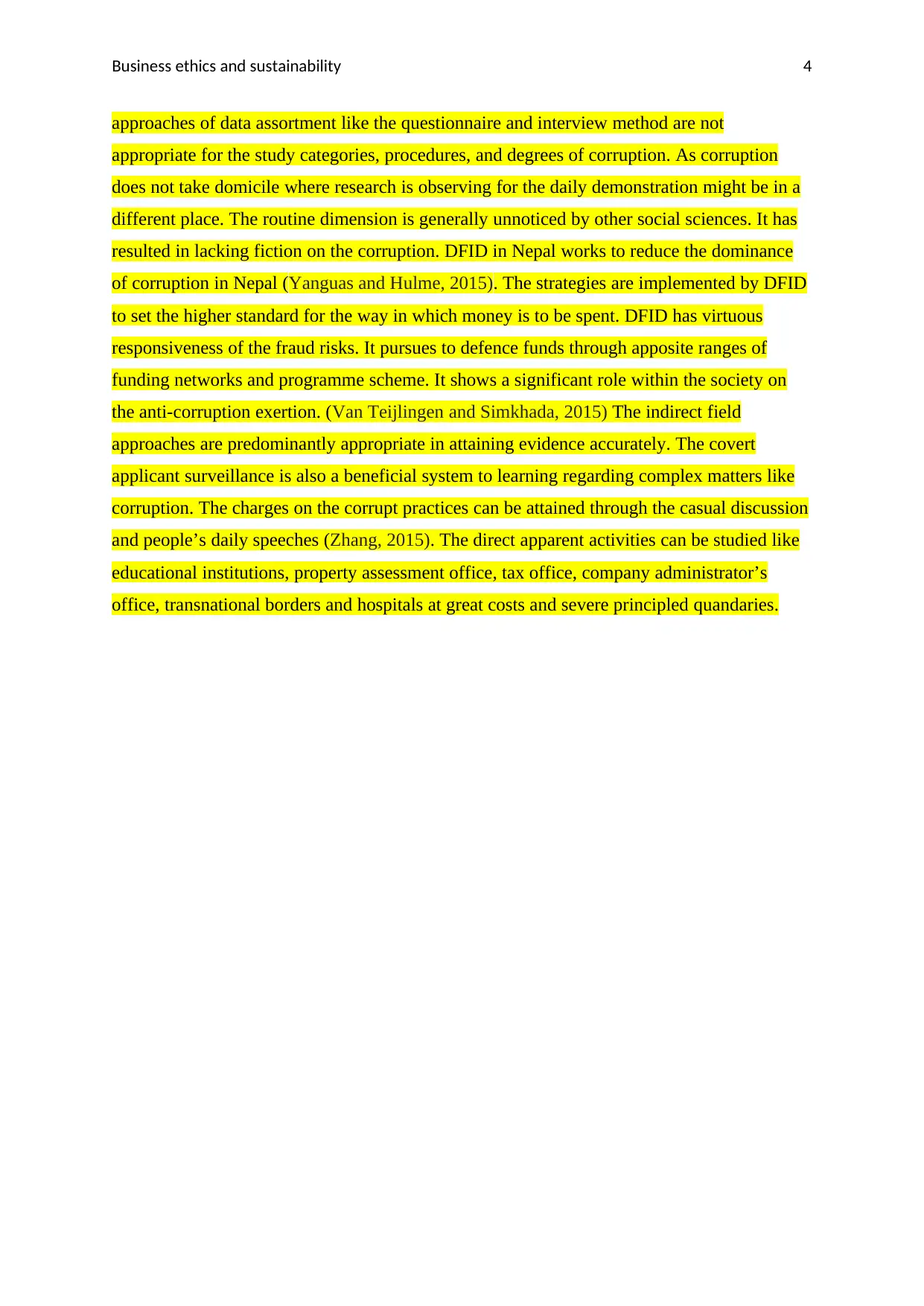
Business ethics and sustainability 4
approaches of data assortment like the questionnaire and interview method are not
appropriate for the study categories, procedures, and degrees of corruption. As corruption
does not take domicile where research is observing for the daily demonstration might be in a
different place. The routine dimension is generally unnoticed by other social sciences. It has
resulted in lacking fiction on the corruption. DFID in Nepal works to reduce the dominance
of corruption in Nepal (Yanguas and Hulme, 2015). The strategies are implemented by DFID
to set the higher standard for the way in which money is to be spent. DFID has virtuous
responsiveness of the fraud risks. It pursues to defence funds through apposite ranges of
funding networks and programme scheme. It shows a significant role within the society on
the anti-corruption exertion. (Van Teijlingen and Simkhada, 2015) The indirect field
approaches are predominantly appropriate in attaining evidence accurately. The covert
applicant surveillance is also a beneficial system to learning regarding complex matters like
corruption. The charges on the corrupt practices can be attained through the casual discussion
and people’s daily speeches (Zhang, 2015). The direct apparent activities can be studied like
educational institutions, property assessment office, tax office, company administrator’s
office, transnational borders and hospitals at great costs and severe principled quandaries.
approaches of data assortment like the questionnaire and interview method are not
appropriate for the study categories, procedures, and degrees of corruption. As corruption
does not take domicile where research is observing for the daily demonstration might be in a
different place. The routine dimension is generally unnoticed by other social sciences. It has
resulted in lacking fiction on the corruption. DFID in Nepal works to reduce the dominance
of corruption in Nepal (Yanguas and Hulme, 2015). The strategies are implemented by DFID
to set the higher standard for the way in which money is to be spent. DFID has virtuous
responsiveness of the fraud risks. It pursues to defence funds through apposite ranges of
funding networks and programme scheme. It shows a significant role within the society on
the anti-corruption exertion. (Van Teijlingen and Simkhada, 2015) The indirect field
approaches are predominantly appropriate in attaining evidence accurately. The covert
applicant surveillance is also a beneficial system to learning regarding complex matters like
corruption. The charges on the corrupt practices can be attained through the casual discussion
and people’s daily speeches (Zhang, 2015). The direct apparent activities can be studied like
educational institutions, property assessment office, tax office, company administrator’s
office, transnational borders and hospitals at great costs and severe principled quandaries.
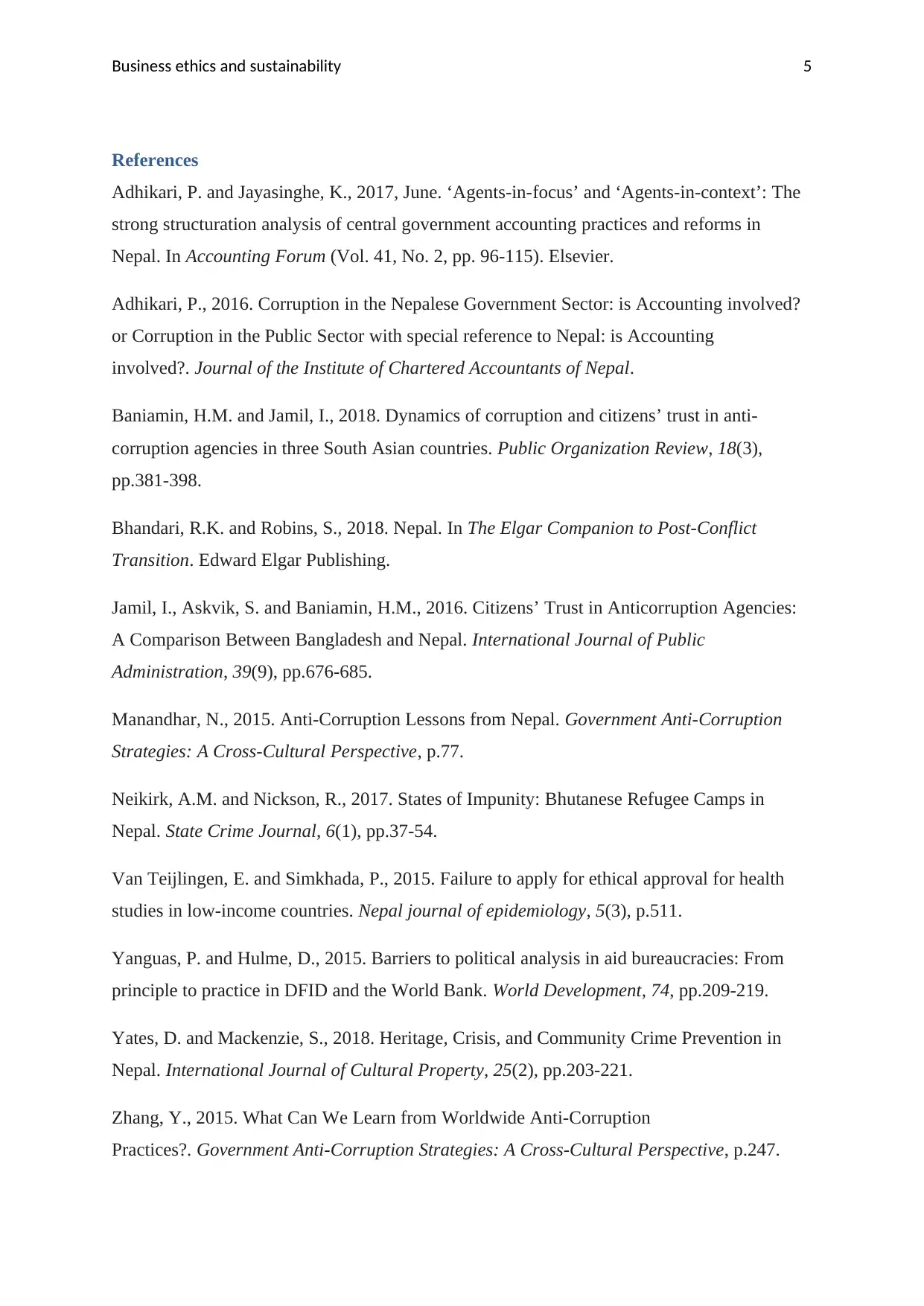
Business ethics and sustainability 5
References
Adhikari, P. and Jayasinghe, K., 2017, June. ‘Agents-in-focus’ and ‘Agents-in-context’: The
strong structuration analysis of central government accounting practices and reforms in
Nepal. In Accounting Forum (Vol. 41, No. 2, pp. 96-115). Elsevier.
Adhikari, P., 2016. Corruption in the Nepalese Government Sector: is Accounting involved?
or Corruption in the Public Sector with special reference to Nepal: is Accounting
involved?. Journal of the Institute of Chartered Accountants of Nepal.
Baniamin, H.M. and Jamil, I., 2018. Dynamics of corruption and citizens’ trust in anti-
corruption agencies in three South Asian countries. Public Organization Review, 18(3),
pp.381-398.
Bhandari, R.K. and Robins, S., 2018. Nepal. In The Elgar Companion to Post-Conflict
Transition. Edward Elgar Publishing.
Jamil, I., Askvik, S. and Baniamin, H.M., 2016. Citizens’ Trust in Anticorruption Agencies:
A Comparison Between Bangladesh and Nepal. International Journal of Public
Administration, 39(9), pp.676-685.
Manandhar, N., 2015. Anti-Corruption Lessons from Nepal. Government Anti-Corruption
Strategies: A Cross-Cultural Perspective, p.77.
Neikirk, A.M. and Nickson, R., 2017. States of Impunity: Bhutanese Refugee Camps in
Nepal. State Crime Journal, 6(1), pp.37-54.
Van Teijlingen, E. and Simkhada, P., 2015. Failure to apply for ethical approval for health
studies in low-income countries. Nepal journal of epidemiology, 5(3), p.511.
Yanguas, P. and Hulme, D., 2015. Barriers to political analysis in aid bureaucracies: From
principle to practice in DFID and the World Bank. World Development, 74, pp.209-219.
Yates, D. and Mackenzie, S., 2018. Heritage, Crisis, and Community Crime Prevention in
Nepal. International Journal of Cultural Property, 25(2), pp.203-221.
Zhang, Y., 2015. What Can We Learn from Worldwide Anti-Corruption
Practices?. Government Anti-Corruption Strategies: A Cross-Cultural Perspective, p.247.
References
Adhikari, P. and Jayasinghe, K., 2017, June. ‘Agents-in-focus’ and ‘Agents-in-context’: The
strong structuration analysis of central government accounting practices and reforms in
Nepal. In Accounting Forum (Vol. 41, No. 2, pp. 96-115). Elsevier.
Adhikari, P., 2016. Corruption in the Nepalese Government Sector: is Accounting involved?
or Corruption in the Public Sector with special reference to Nepal: is Accounting
involved?. Journal of the Institute of Chartered Accountants of Nepal.
Baniamin, H.M. and Jamil, I., 2018. Dynamics of corruption and citizens’ trust in anti-
corruption agencies in three South Asian countries. Public Organization Review, 18(3),
pp.381-398.
Bhandari, R.K. and Robins, S., 2018. Nepal. In The Elgar Companion to Post-Conflict
Transition. Edward Elgar Publishing.
Jamil, I., Askvik, S. and Baniamin, H.M., 2016. Citizens’ Trust in Anticorruption Agencies:
A Comparison Between Bangladesh and Nepal. International Journal of Public
Administration, 39(9), pp.676-685.
Manandhar, N., 2015. Anti-Corruption Lessons from Nepal. Government Anti-Corruption
Strategies: A Cross-Cultural Perspective, p.77.
Neikirk, A.M. and Nickson, R., 2017. States of Impunity: Bhutanese Refugee Camps in
Nepal. State Crime Journal, 6(1), pp.37-54.
Van Teijlingen, E. and Simkhada, P., 2015. Failure to apply for ethical approval for health
studies in low-income countries. Nepal journal of epidemiology, 5(3), p.511.
Yanguas, P. and Hulme, D., 2015. Barriers to political analysis in aid bureaucracies: From
principle to practice in DFID and the World Bank. World Development, 74, pp.209-219.
Yates, D. and Mackenzie, S., 2018. Heritage, Crisis, and Community Crime Prevention in
Nepal. International Journal of Cultural Property, 25(2), pp.203-221.
Zhang, Y., 2015. What Can We Learn from Worldwide Anti-Corruption
Practices?. Government Anti-Corruption Strategies: A Cross-Cultural Perspective, p.247.
⊘ This is a preview!⊘
Do you want full access?
Subscribe today to unlock all pages.

Trusted by 1+ million students worldwide
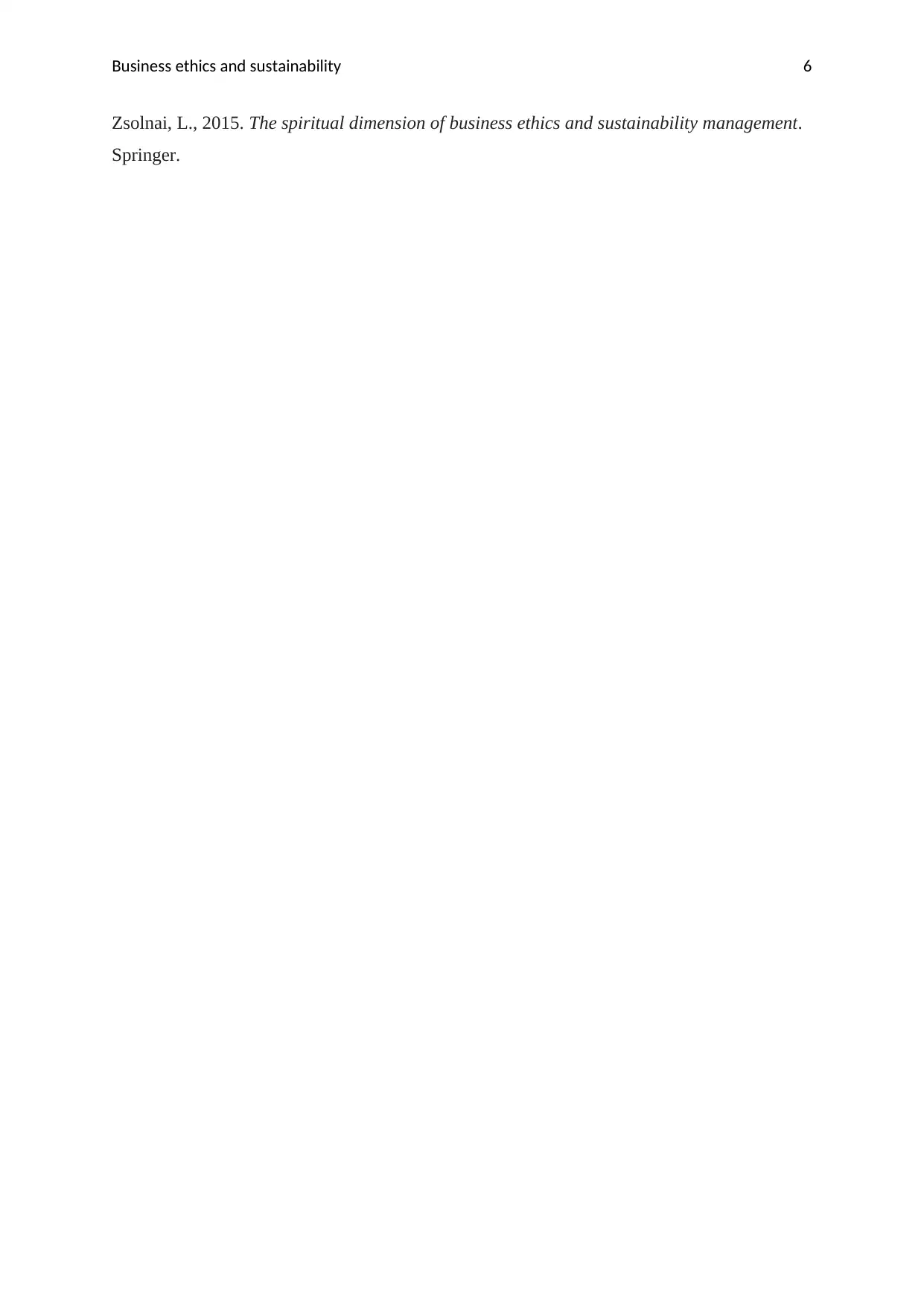
Business ethics and sustainability 6
Zsolnai, L., 2015. The spiritual dimension of business ethics and sustainability management.
Springer.
Zsolnai, L., 2015. The spiritual dimension of business ethics and sustainability management.
Springer.
1 out of 7
Related Documents
Your All-in-One AI-Powered Toolkit for Academic Success.
+13062052269
info@desklib.com
Available 24*7 on WhatsApp / Email
![[object Object]](/_next/static/media/star-bottom.7253800d.svg)
Unlock your academic potential
Copyright © 2020–2026 A2Z Services. All Rights Reserved. Developed and managed by ZUCOL.




